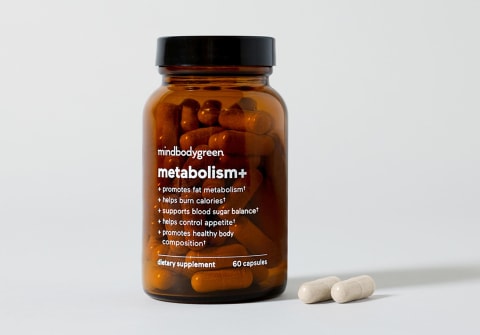Advertisement
Thinking Hard May Burn More Calories Than Mindless Tasks


Mental tasks zap a lot of physical energy and often leave you feeling drained (even if you haven't moved all day). So does working your mind burn the same calories as an actual workout? Not quite. While a marathon day at your desk job will never equate to the physical output of actually running a marathon, a stimulated brain may burn more calories than one engaged in mindless activities.
Here's what you need to know.
The brain burns a lot of calories at rest
Your body is constantly burning calories. Calories are a unit of measurement for energy, and it takes a lot of energy to breathe, keep blood flowing, digest food, and regulate your temperature. The brain orchestrates almost all bodily functions, and it requires a lot of energy to do so.
This vital organ uses about 20% of the energy 1the body burns at rest. So, say you burn 1,600 at rest, about 320 calories would be diverted to power the brain alone.
Like other organs in the body, blood vessels deliver energy to the brain mainly in the form of glucose (blood sugar). When a region of the brain is activated, blood vessels dilate to increase blood flow and nutrients like glucose to meet the higher energy demands of that region.
And blood flow seems to increase more to regions of the brain involved in more complex mental tasks. Researchers of a small study published in 2021 found that completing a higher-demand cognitive test was associated with increases in blood flow in the middle cerebral artery2, whereas lower-demand tasks or resting was not.
Mental exertion may increase calorie burn
It's this potential mechanism that may be behind why non-physically demanding tasks increase the rate of calories burned.
Current estimates from Harvard show that a 155-pound person could expect to burn an additional 80 calories an hour reading, 70 calories an hour standing in line, and 44 calories an hour sleeping (yes the brain is active during sleep).
But these are pretty rough estimates, as there's not much rigorous data directly tying cognitive effort and overall calories burned. If you're looking for sneaky-easy ways to burn more calories and rev up your metabolism, you (unfortunately) can't think your way there.
Here are more effective ways to support your metabolism
Metabolic health—or how efficiently you generate and utilize energy—is highly influenced by everyday lifestyle choices. Research shows that focusing on these four areas can help support your metabolism:
1. Prioritize quality sleep.
About one-third of American adults3 sleep less than the recommended seven to nine hours of sleep each night. Poor sleep is linked to multiple measures of metabolic dysfunction4 like increased appetite, weight gain, and worsened blood sugar control. However, sleeping sufficiently helps you maintain optimal physical and mental energy throughout the day.
Practice good sleep hygiene by creating a nightly wind-down ritual, reserving screen time for earlier in the day, avoiding late-night alcohol, and getting more sunlight during the day (for more ideas, check out these M.D.-approved tips).
2. Add strength training to your routine.
Strength training involves pushing, pulling, or lifting heavy objects to grow your muscles, and it's one of the best ways to increase your basal metabolic rate (aka how many calories you burn at rest). It's generally recommended to get two sessions of strength training in a week to work all major muscle groups (like your back, chest, legs, etc.).
You can strength train at the gym or through everyday activities such as carrying children (or laundry) up the stairs.
3. Eat a healthy diet.
This may not be a shock, but diet is one of the biggest influences on your metabolic health5. Eating a macronutrient-balanced, nutrient-rich diet not only supports muscle growth from strength-training, but it plays a key role in promoting blood sugar balance, satiety, and fat metabolism.
While a balanced macronutrient breakdown (aka carbs to protein to fat ratio) may look different from person to person, the components of a healthy diet remain relatively consistent:
- Complex carbs: Whole grains, vegetables, fruit, legumes
- Healthy fats: Avocados, nuts, seeds, olive oil, fatty fish
- Lean protein: Fish, poultry, grass-fed beef or pork
4. Try mbg's metabolism+.
Targeted supplementation via mbg's metabolism+ may be a great addition to a metabolically focused daily routine.
This multidimensional formula features four plant extracts (capsaicin, veld grape, and caffeine and EGCG from green tea) that have been clinically studied to drive energy expenditure, support a healthy body composition, and regulate appetite hormones.*
Supplements—including metabolism+—are designed to be used as part of a holistic approach (along with the other lifestyle recommendations in this article) to optimizing energy balance rather than a sole solution.
The takeaway
Thinking hard can potentially burn more calories than mindless sedentary activities, but it's not enough to move the needle on improving your metabolic health. Exercising your brain is best used to support healthy cognitive function and aging. And if your focus is on amping up your metabolic health, comprehensive lifestyle changes that focus on sleep, strength training, diet, and targeted supplementation are your best bet for promoting energy balance and increasing your metabolic rate.*
Watch Next
Enjoy some of our favorite clips from classes
Enjoy some of our favorite clips from classes
What Is Meditation?
Mindfulness/Spirituality | Light Watkins
Box Breathing
Mindfulness/Spirituality | Gwen Dittmar
What Breathwork Can Address
Mindfulness/Spirituality | Gwen Dittmar
The 8 Limbs of Yoga - What is Asana?
Yoga | Caley Alyssa
Two Standing Postures to Open Up Tight Hips
Yoga | Caley Alyssa
How Plants Can Optimize Athletic Performance
Nutrition | Rich Roll
What to Eat Before a Workout
Nutrition | Rich Roll
How Ayurveda Helps Us Navigate Modern Life
Nutrition | Sahara Rose
Messages About Love & Relationships
Love & Relationships | Esther Perel
Love Languages
Love & Relationships | Esther Perel


















